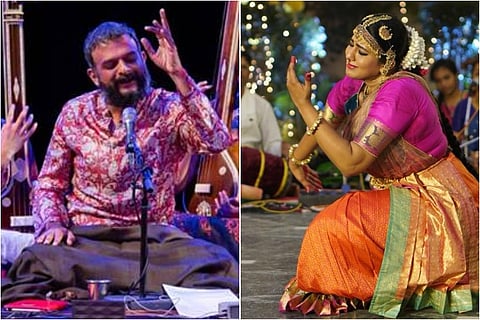

Days after the MeToo movement gained momentum in India, several artistes have come together to break the veil of silence that has so far shrouded such allegations in the performing arts sector and expressed their solidarity in condemning sexual harassment at the workplace.
Popular dancer and actor Swarnamalya Ganesh initiated a public consultation process for the advocacy of redressal in the performing arts.
“We will make every sphere of Performing arts from Private dance schools, sabhas, organizations, government nodal agencies, ministry, artiste, universities accountable. No matter your gender, power, status, age you will never intimidate us anymore. Taking this forward. If the performing artistes want to continue your radio silence, its fine. Coz this battle is fought for you too. Your children will live in a safer space from now on (sic),” she wrote on her Facebook page on Thursday.
Several young Carnatic musicians from across the world have now come together and are signing an open document requesting for the constitution of a body to address such issues and to create a safer environment in the Carnatic community. The document has over 300 signatures so far and the number is growing by the minute.
“We ask for due process through civil society investigations into these allegations to hold these individuals accountable, and whole-heartedly welcome those who want to come forward and share their stories. At this juncture, we also encourage and request sabhas and cultural organisations all over the world to recognise this issue and put forward proactive structural measures to address such claims and prevent future incidents. We believe that this will make the Carnatic community safer for all,” reads the document that is being shared widely on Twitter.
It's time we--youth of the Carnatic community--stood up for what is just and morally right. The #metoo movement is strong and cannot be ignored.
— Abhinav Seetharaman (@AbhiSeeTheRamen) October 13, 2018
To view the growing document: https://t.co/Ld9kaelvpn
Thank you to @Chinmayi for empowering so many women in India to speak out. pic.twitter.com/FcsUgHvoX8
It is wonderful that over 200 members of the Karnatik community from across the globe have come together to say unequivocally that sexual abuse will not be tolerated.
— T M Krishna (@tmkrishna) October 14, 2018
Please share widelyhttps://t.co/VyqJKQ7pQ0 #MeToo
Popular singers like Ranjani and Gayatri, TM Krishna, Sriram Parthasarathy and Bombay Jayashri have signed the document so far.
Speaking to TNM, Swarnamalya shares that there are no systemic redressal procedures in place, specifically in the performing arts, under the Ministry of Culture. “Performing arts is a largely unorganised sector, most of the organisations are private and so accountability is a major problem. The Ministry has to intervene to hold people accountable for their actions,” she explains.
The draft of an advocacy plan lists nine points that can be adopted. Setting up of a sexual harassment cell under the Ministry of Culture, a committee that follows Vishaka guidelines, redressal cell, are some of the mandates listed in the draft.
Swarnamalya also shares that while Raya Sarkar’s list did create a ripple, the present MeToo movement is making much deeper grooves. “While Pappu Venugopala Rao did step down from his post at the Music Academy, the real reason behind it was not discussed clearly. I think it is important to speak up during such times. It died down because of the radio silence from the senior artistes,” she says, adding, “It helps the younger generation to open up more freely when their gurus do.”
She also tells us that if such allegations are found to be true, the person in question should be held accountable and face consequences. “Taking back any Sangeet Natak Akademi Awards, lowering of position in the field and grading with Doordarshan, and blacklisting on Indian Council for Cultural Relations (ICCR) can be effective deterrents,” she further explains.
The need for an independent redressal system beyond the confines of organisations is paramount to encourage survivors to open up, says Swarnamalya. “Also, the committee should be made up of strong members coming from diverse fields. If the committee is going to consist of members from the artistic community who might tend to back the perpetrator(s), then the reason for its existence is lost,” she adds.
With the help of Ek Potlee Ret Ki (Kaani Nilam), an activists’ collective that works on cultural identities, Swarnamalya plans to take this up with the Ministry of Culture soon.
Radhika Ganesh, the founding member of Ek Potlee Ret Ki, shares that the collective has long been working on making cultural spaces safe for young artists, both male and female.
“While MeToo is more of an urban movement, we’ve had voices from semi-urban and rural places where young artistes venturing out looking for opportunities come back with very bad experiences. We are more keen to take it further and with the MeToo Movement, we feel the time is now right,” Radhika tells TNM.
The consultation process will invite opinions from all kinds of stakeholders. “The idea is to create a working body that does not just follow due process or remains defunct, as is the case with most such redressal cells. We invite people to come forward with suggestions to implement the same,” she adds.